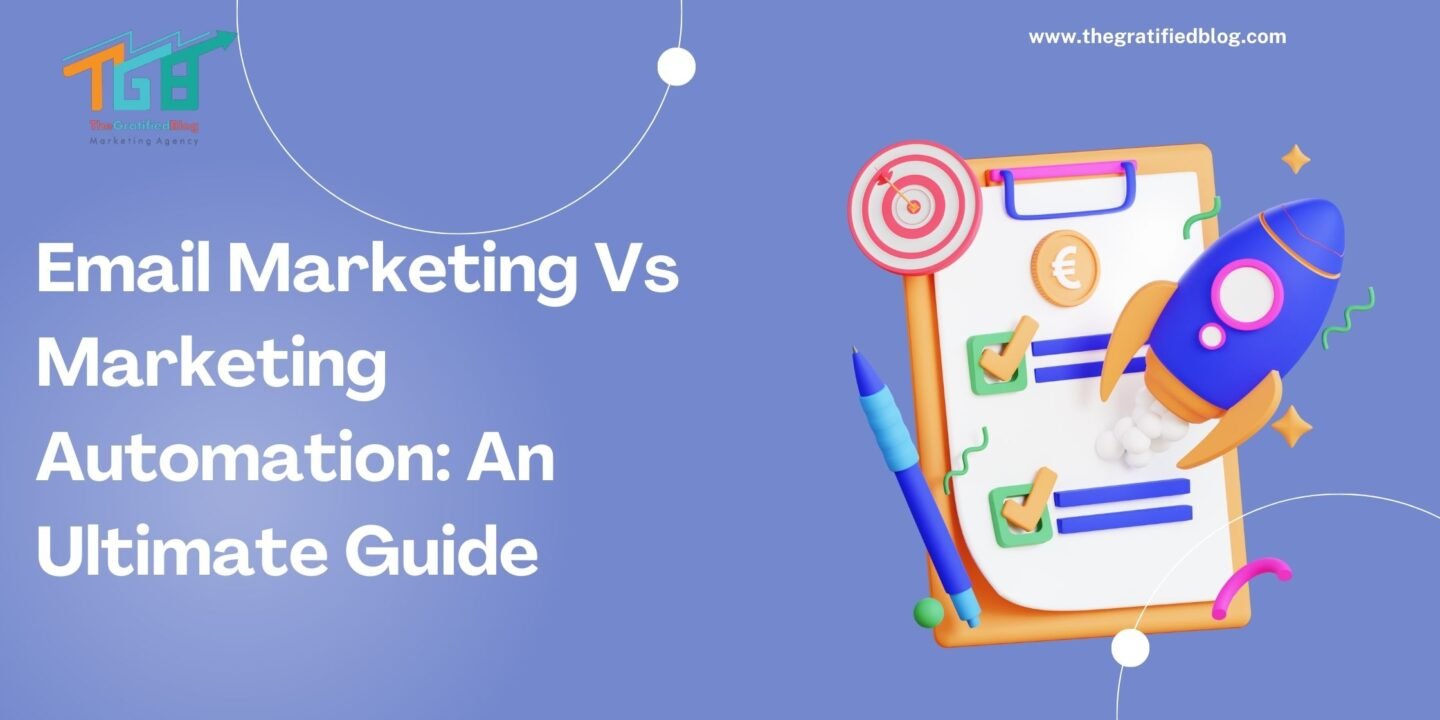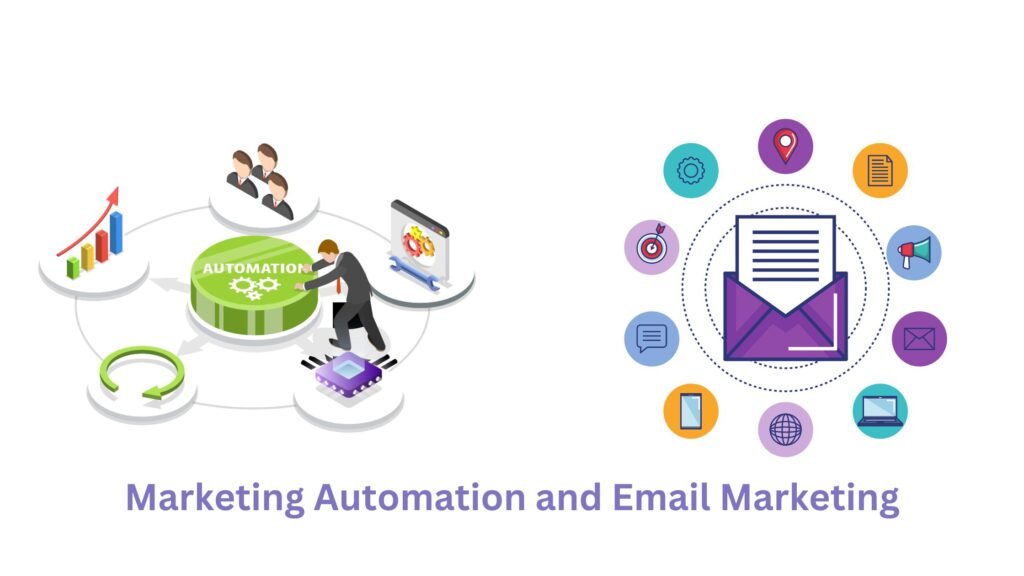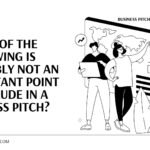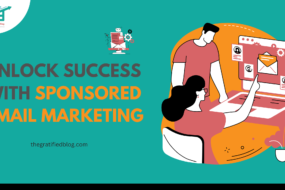
In the ever-evolving digital marketing landscape, two powerful tools have emerged as game-changers for businesses seeking to engage, nurture, and convert their audiences effectively. Email marketing and marketing automation have become synonymous with reaching the right people at the right time, but they come with distinct strategies, advantages, and considerations.
While both methods aim to enhance customer interactions and drive revenue, they offer contrasting approaches to achieving these goals. This blog post will delve into the dynamic world of email marketing vs. marketing automation, highlighting their distinctive features and exploring how they can be integrated seamlessly to create a comprehensive marketing strategy.
What Is Marketing Automation and Email Marketing?

Email marketing and automation are two integral components of a comprehensive digital marketing strategy, offering distinct benefits and functions. Email marketing is a focused approach that involves crafting and dispatching focused emails to a list of subscribers.
It primarily aims to build relationships, promote products or services, and engage with an audience personally. Email marketing is known for its versatility, allowing businesses to send subscribers newsletters, promotions, and informative content. It enhances its effectiveness by relying on list building, segmentation, and personalization.
Marketing automation, on the other hand, is a broader strategy that employs technology to automate and optimize a wide range of marketing activities. While email marketing is a vital part of marketing automation, automation goes beyond emails to encompass tasks such as lead nurturing, scoring, workflow automation, and multi-channel engagement.
Marketing automation is designed to streamline and enhance the overall marketing process by using data-driven insights to deliver highly personalized content and messages at the right time and through the proper channels. It’s a holistic approach that aims to create a seamless and efficient customer journey.
Email Marketing Vs Marketing Automation: Key Differences
Email marketing and automation represent two distinct approaches to digital marketing, each offering unique characteristics and significant differences. Let’s delve into the primary distinctions between these strategies:
- Scope and Complexity:
- Email marketing is focused on sending targeted emails to a subscriber list. It is a straightforward strategy, mainly centered around creating and distributing email campaigns.
- Marketing automation, encompassing a broader range of marketing activities, automates email communication and lead nurturing, scoring multi-channel engagement, and intricate workflow management.
- Personalization:
- Although email marketing enables some personalization through list segmentation and tailored content, it may not achieve advanced personalization beyond basic segmentation.
- Marketing automation strategies excel at personalization by utilizing data to deliver highly customized content. It adjusts the timing, channel, and message based on user behavior and preferences.
- Workflow and Automation:
- Email marketing typically requires manual scheduling and sending of email campaigns with limited automation capabilities.
- Marketing automation is a core feature, facilitating the creation of sophisticated marketing workflows triggered by specific user actions or events, automating repetitive tasks, and ensuring timely, personalized communication.
- Lead Nurturing:
- Email marketing can nurture leads through well-timed email sequences, but it may need to match the depth of lead nurturing capabilities in marketing automation.
- Marketing automation is well-suited for lead nurturing, delivering personalized messages to guide leads through the sales funnel, scoring their interactions, and adjusting content accordingly.
- Multi-Channel Engagement:
- Email marketing primarily focuses on email communication and may not encompass other communication methods.
- Marketing automation offers the flexibility to include various communication platforms, encompassing email, SMS, and social media. And more, providing users with a seamless, multi-channel experience.
- Analytics and Reporting:
- Email marketing provides basic analytics on open, click-through, and conversion rates.
- Marketing automation platforms provide advanced analytics and reporting, facilitating a more thorough evaluation of the entire marketing strategy.
Email Marketing Vs Marketing Automation: Choosing The Right Strategy

To determine which strategy is right for your business, consider the following factors:
- Business Goals: Define your marketing objectives. Email marketing is sufficient if your primary goal is to engage with existing subscribers and maintain customer relationships. Marketing automation might be better for more complex customer journeys and lead nurturing.
- Audience Size: Email marketing is cost-effective if you have a smaller audience and want to keep things simple. Marketing automation is better suited for more extensive lists and more advanced segmentation.
- Resource Availability: Email marketing can be managed with a minor team, but marketing automation often requires more technical expertise and resources.
- Budget: Marketing automation platforms can be more expensive than email marketing tools, so consider your budget.
The Importance Of Aligning Your Strategy With Your Business’s Specific Needs
Aligning your strategy with your business’s specific needs is crucial for several reasons:
- Efficiency: When your strategy matches your business’s needs, you can use your resources more efficiently. This means saving time, money, or effort on activities that won’t bring the desired results. Instead, you can focus on what matters.
- Relevance: Every business is unique, and what works for one may not work for another. By aligning your strategy with your specific needs, you ensure your marketing efforts are relevant to your target audience and market. This relevance helps in building stronger connections with your customers.
- Competitive Advantage: Understanding and addressing your business’s needs can give you a competitive edge. You can tailor your strategy to stand out in your industry by providing services or products that are in demand and solving the particular pain points of your customers.
- Customer Satisfaction: When your strategy caters to your business’s needs, it leads to higher customer satisfaction. You can offer what your customers are looking for, which results in happier and more loyal customers.
- Adaptability: Businesses evolve. By aligning your strategy with your specific needs, you can adapt more effectively to changes in the market, customer preferences, or internal developments. This adaptability is essential for long-term success.
- Measurable Results: A strategy tailored to your needs is more accessible to measure and evaluate. You can set clear, relevant KPIs (Key Performance Indicators) that reflect your goals and objectives, making it more straightforward to gauge your progress and make necessary adjustments.
- Cost Control: Investing in marketing activities aligned with your business’s needs can prevent unnecessary expenses. You won’t spend resources on strategies or campaigns that don’t contribute to your bottom line.
- Risk Reduction: You can identify and mitigate potential risks more effectively by addressing your specific needs. You’ll be better prepared to handle challenges or market shifts that affect your business.
FAQs
Q1. Can I use email marketing and marketing automation together?
Yes, many businesses use both email marketing and marketing automation in conjunction. Email marketing is often a component of marketing automation, allowing businesses to send targeted emails as part of more extensive automated campaigns.
Q2. Is email marketing a marketing automation?
No, email marketing is not the same as marketing automation. Marketing automation includes email marketing as one of its components, focusing solely on email campaigns. In contrast, marketing automation encompasses a broader range of marketing activities, often including email marketing and various other automated processes and multi-channel campaigns.
Q3. Can marketing automation work for a small business?
Yes, marketing automation can work for small businesses. While it’s often associated with larger enterprises, marketing automation solutions are designed to be scalable and affordable for smaller businesses. Streamlining processes through marketing automation can be advantageous for small businesses, nurturing leads and automating repetitive tasks, ultimately saving time and resources while improving their marketing efficiency and effectiveness. It’s essential to choose a marketing automation platform that matches the particular requirements and budget of your small business.
Conclusion
In the world of digital marketing, the choice between email marketing and marketing automation is not a matter of one being better than the other; it’s about finding the right fit for your business’s unique needs and goals. Email marketing offers a fantastic platform for building relationships, personalizing content, and maintaining engagement with your audience. It’s cost-effective, user-friendly, and perfect for businesses looking to nurture their existing customer base and provide a personalized experience.
On the other hand, marketing automation takes a broader approach, offering a more comprehensive solution for businesses with larger audiences and complex customer journeys. It enables you to create multichannel campaigns, nurture leads, and trigger behavior-based responses, making it ideal for businesses focusing on lead generation and conversion.
Share your thoughts! Feel free to leave a comment on our blog and join the discussion!








No Comments